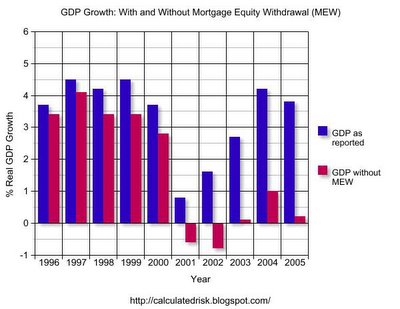Some people (especially realtors) like to argue that the worst case scenario now for the housing market is a so-called "soft landing" or stagnant pricing power. The support for their argument is usually along the lines that the economy is healthy. Personally, I don't know what planet they are talking about because here in my corner of Earth I don't see many signs that the economy is particularly healthy; I see a lot of people who either work for significantly less money than they did a few short years ago or who in some way or another are dependent on a continually expanding housing bubble. Maybe it depends on what one means by "healthy".
Well, over at CalculatedRisk there is
a nice graph and article that illustrates what "healthy" means; the graph is reproduced here, below. In the graph, "MEW" stands for "Mortgage Equity Withdrawl".



3 comments:
I guess this emperor really has no clothes.
Wonder what this country has become. Obession with getting rich and spending it quick.
If Country A saves and invests in its infrastructures and education, and Country B takes on massive debt and its economy is to a large degree driven by buying and selling properties to each other (and related industries such as conscruction, remodeling, re agents, lending, banking, etc.), which country do you think has the brighter future?
And the sad thing is Country A is lending huge amount of money to Country B and uses Country B's consumption drive to fund Country A's growth. One day Country B will be huge in debt to Country A.
The Fed policymakers today eliminated a description they had used each time they raised rates over the past year and a half.
Economists viewed that deletion as a sign from the Fed that its rate-raising campaign was drawing to a close.
However, the US currency got sold off after the announcement right away. If the US dollar continues to fall in the future, this will scare some foreign central bankers who hold massive US Treasury. If they decide to bail out some of their holdings, the interest rates will rise despite what the Fed intends to do. Beware of the interest rate moves for the near future. This rising interest rate might continue due to market force.
Anonymous said...
Food for thought from the following quote:
""Warren Buffett recently made headlines by saying America is more likely to turn into a "sharecroppers' society" than an "ownership society." But I think the right term is a "debt peonage" society - after the system, prevalent in the post-Civil War South, in which debtors were forced to work for their creditors."
Paul Krugman, New York Times
Post a Comment